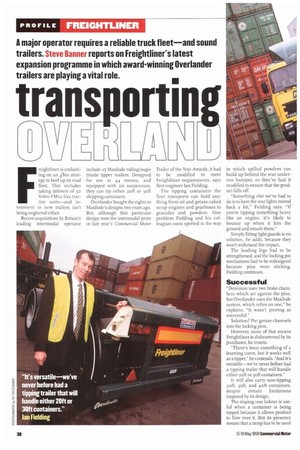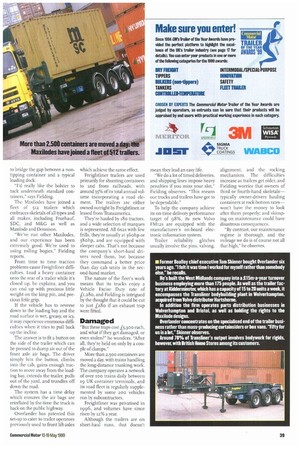A major operator requires a reliable truck fleet—and sound trailers.
Page 40

Page 41

If you've noticed an error in this article please click here to report it so we can fix it.
Steve Banner reports on Freightliner's latest expansion programme in which award-winning Overlander trailers are playing a vital role.
Freightliner is embarking on an gm strategy to beef up its road fleet. This includes taking delivery of 5o Volvo FMI2 6x2 tractive units—and investment in new trailers isn't being neglected either.
Recent acquisitions by Britain's leading intermodal operator include 25 Maxilode rolling-bogie triaxle tipper trailers. Designed for use at 44 tonnes, and equipped with air suspension, they can tip either 2.oft or 3oft shipping containers.
Overlander bought the rights to Maxilode's designs two years ago. But, although this particular design won the intermodal prize in last year's Commercial Motor
Trailer of the Year Awards, it had to be modified to meet Freightliner requirements, says fleet engineer Ian Fielding.
The tipping containers the fleet transports can hold anything from oil and grease-caked scrap engines and gearboxes to granules and powders. One problem Fielding and his colleagues soon spotted is the way in which spilled powders can build up behind the rear underrun bumper, so they've had it modified to ensure that the product falls oil "Something else we've had to do is to have the rear lights moved back a bit," Fielding says. "If you're tipping something heavy like an engine, it's likely to bounce up when it hits the ground and smash them."
Simply fitting light guards is no solution, he adds, because they won't withstand the impact.
The landing legs had to be strengthened, and the locking pin mechanism had to be redesigned because pins were sticking, Fielding continues.
Successful
"Dennison uses two brake chambers which act against the pins, but Overlander uses the Maxilode system, which relies on one," he explains. "It wasn't proving as successful."
Solution? Put grease channels into the locking pins.
However, none of that means Freightliner is disheartened by its purchases, he insists.
"There's been something of a learning curve, but it works well as a tipper," he contends. "And it's versatile—we've never before had a tipping trailer that will handle either 20ft or 3 oft containers.'
It will also carry non-tipping 20ft, 3 oft, and 4oft containers, despite certain limitations imposed by its design.
The sloping rear bolster is useful when a container is being i pped because it allows product to flow over it. But its presence means that a ramp has to be used to bridge the gap between a nontipping container and a typical loading dock.
"I'd really like the bolster to tuck underneath standard containers," says Fielding.
The Maxilodes have joined a fleet of 512 trailers which embraces skeletals of all types and all makes, including Fruehauf, SDC, and M&G as well as Maxilode and Dennison.
"We've run other Maxilodes, and our experience has been extremely good. We're used to using rolling bogies," Fielding reports.
From time to time traction problems cause Freightliner difficulties. toad a heavy container onto the rear of a trailer while it's closed up, he explains, and you can end up with precious little weight on the king pin, and precious little grip.
If the vehicle has to reverse down to the loading bay and the road surface is wet, greasy, or icy, it may experience enormous difficulties when it tries to pull back up the incline.
The answer is to fit a button on the side of the trailer which can be pressed to dump air out of the front axle air bags. The driver simply hits the button, climbs into the cab, gains enough traction to move away from the loading bay, extends the trailer, pulls Out of the yard, and trundles off down the road.
The system has a time delay which ensures the air bags are reinflated by the time the truck is back on the public highway.
Overlander has patented this set-up to cater to trailer operators previously used to front lift-axles
which achieve the same effect.
Freightliner trailers are used primarily for shunting containers to and from railheads, with around 35% of its total annual volume incorporating a road element. The trailers are either owned outright by Freightliner, or leased from Transamerica.
They're hauled by 18o tractors, and a wide selection of marques is represented. Al] 6x2s with few frills, they're usually at 36ohp or 38ohp, and are equipped with sleeper cabs. That's not because the company's short-haul drivers need them, but because they command a better price than day cab units in the second-hand market.
The nature of the fleet's work means that its trucks enjoy a Vehicle Excise Duty rate of £1,280, and Fielding is intrigued by the thought that it could be cut to just 2,8o if an exhaust trap were fitted.
Damaged
"But these traps cost L5,3oo each, and what if they get damaged, or even stolen?" he wonders. "After all, they're held on only by a couple of clamps."
More than 2,500 containers are moved a day, with trains handling the long-distance trunking work. The company operates a network of over too trains daily between 19 UK container terminals, and its road fleet is regularly supplemented by some zoo vehicles run by subcontractors, Freightliner was privatised in 1996, and volumes have since risen by 12% a year.
Although the trailers are or' short-haul runs, that doesn't mean they lead an easy life.
"We do a lot of timed deliveries, and shipping lines impose heavy penalties if you miss your slot," Fielding observes. "This means our trucks and trailers have got to be dependable."
To help the company achieve its on-time delivery performance target of 98%. its new Volvo FMI2s are equipped with the manufacturer's on-board electronic information system.
Trailer reliability glitches usually involve the pins, valving, alignment, and the rocking mechanism. The difficulties increase as trailers get older, and Fielding worries that owners of third or fourth-hand skeletalstypically owner-drivers hauling containers at rock-bottom rates— won't have the money to look after them properly; and skimping on maintenance could have disastrous consequences.
"By contrast, our maintenance regime is thorough. and the mileage we do is of course not all that high," he observes.
















































































































